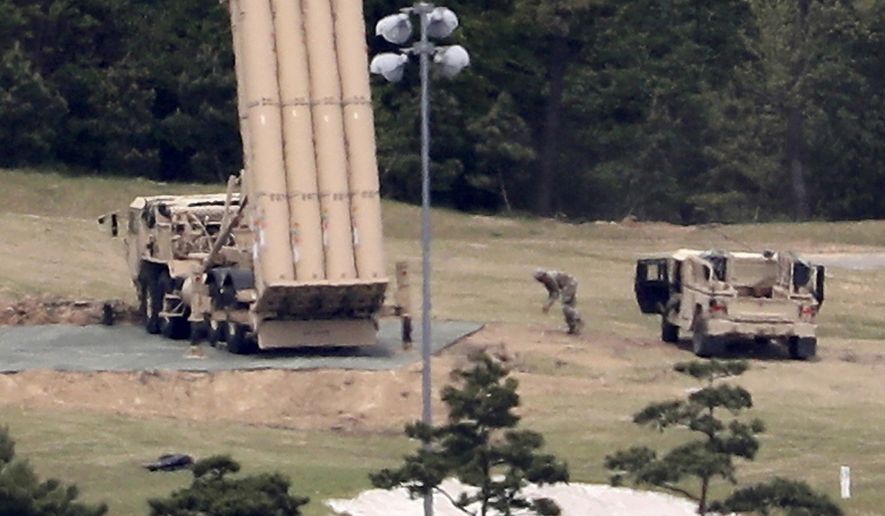The decision by South Korea’s new president to suspend the U.S. military’s deployment of a Terminal High Altitude Area Defense — THAAD — missile defense system to the nation has drawn frustration this week from an influential Republican lawmaker in Washington.
House Foreign Affairs Committee Chairman Ed Royce issued a statement Wednesday night lamenting reports that South Korean President Moon Jae-in had halted the partially-installed system’s progress until his administration can complete an environmental impact assessment.
“The THAAD defensive missile system is critical to protecting South Koreans from Km Jong Un’s arsenal,” Mr. Royce said in reference to the leader of North Korea, whose increasing number of ballistic missile tests are what prompted American officials to deploy the system to South Korea.
“I hope any environmental concerns related to the full deployment of THAAD will be dispelled with a quick and thorough review,” the California Republican said. “We need to use every tool at our disposal — including additional sanctions — to address the Kim regime’s threats.”
Mr. Royce’s statement came hours before North Korea test launched several suspected short-range, anti-ship missiles on Thursday in the latest sign that Pyongyang is continuing to make progress with its weapons program despite pressure from Washington and its allies.
There was no explicit statement on THAAD from Mr. Moon this week. However, a senior official from the South Korean president’s administration told reporters Wednesday, according to The New York Times, that two of THAAD’s already-installed missile launchers could remain in place, while four yet to be deployed launchers would not be set up until the Moon administration completes an environmental assessment.
SEE ALSO: South Korea THAAD protesters see U.S. militarism, not protection
It’s unclear how long that may take.
The suspension of THAAD could be read as a concession by the new government in Seoul to China, which has expressed outrage over the system and claimed that the real reason behind Washington’s deployment of it is to spy on and contain Chinese — not North Korean — military assets.
U.S. officials say the Chinese complaints over THAAD’s powerful “X-band” radar are unfounded and have alternatively pushed on China, which is North Korea’s main ally and trade partner, to work with Washington toward pressuring Pyongyang into abandoning its nuclear weapons and missile provocations.
“We must continue to press China and Russia to play more productive roles, since North Korea’s nuclear program endangers us all,” said Mr. Royce.
But China has been applying economic pressure on South Korea since the Obama administration reached an agreement last year with Mr. Moon’s predecessor to allow for THAAD’s deployment to the nation. Among other actions, Beijing has put a cap on Chinese tourism, triggering significant losses to the South Korean economy.
At the same time, THAAD has prompted protests from South Korean peace activists and has been a source of increasing public controversy in the nation since the Trump administration ordered its deployment to begin in March.
Mr. Moon, who became South Korea’s president last month, had promised on the campaign trail to order a review of THAAD, arguing that the system’s deployment failed to take into consideration the potential fallout for South Korea.
The situation is at at the center of multiple legal challenges in Seoul. Some 2,000 South Koreans have asked the nation’s constitutional court to weigh whether the government violated their rights by secretly rushing THAAD’s authorization without public oversight or a legally mandated environmental impact assessment.
• Guy Taylor can be reached at gtaylor@washingtontimes.com.




Please read our comment policy before commenting.